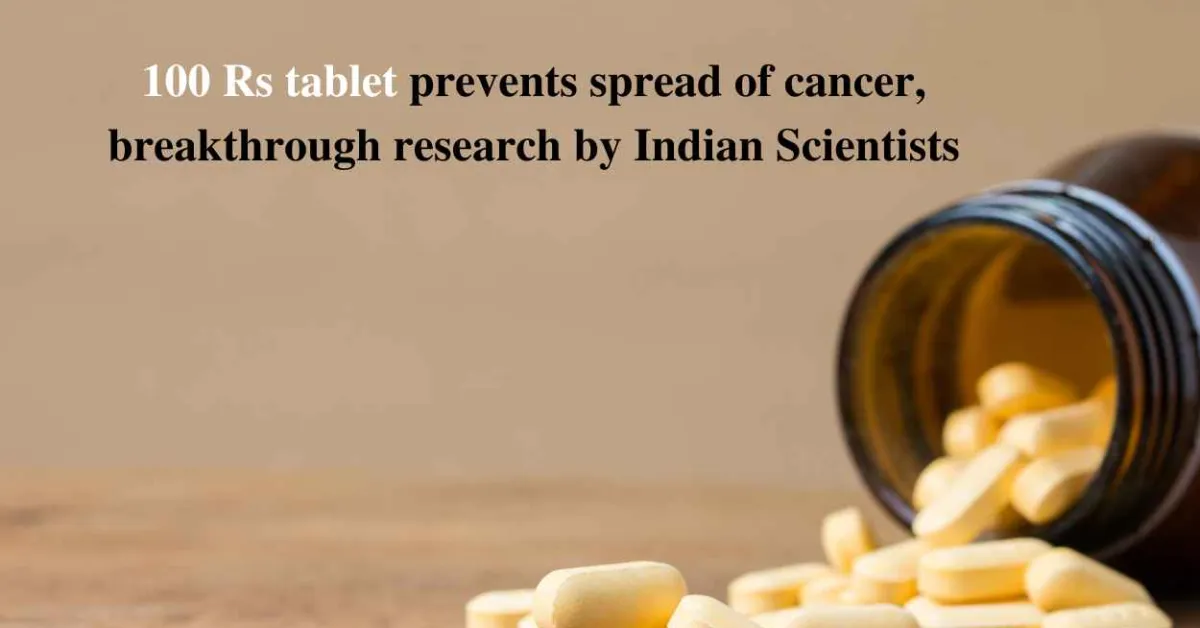The breakthrough research by TATA memorial centre scientists who have developed a tablet which reduces side effects of cancer treatment and prevent resurgence or relapse of cancer said Dr Rajendra Badwe, Director of the Tata Memorial Centre in an interview with NDTV. The said tablet will be available at an affordable price of Rs. 100 a tablet.
A unique, yet dangerous property that cancer cells possess is that they can occasionally spread from the primary site to other sites in the body. This is called metastasis and can be difficult to treat. A growing body of research suggests that dying cancer cells release cell-free chromatin particles (cfChPs, or fragments of chromosomes) which can turn healthy cells into cancerous ones. Some of the cfChPs may fuse with healthy chromosomes and cause new tumours.
A recent study examined whether chemotherapy, radiotherapy, or surgery, which generate dying cancer cells, could contribute to the cancer’s metastatic spread. To do this, researchers led by Prof. Indraneel Mittra from the Translational Research Laboratory, TMC, ACTREC, grafted human breast cancer cells in immune-deficient mice to generate tumours. The mice then received treatment in the form of chemotherapy, radiotherapy, or surgery; half of them also received agents that deactivate or destroy cfChPs.
The researchers not only found the presence of human DNA (cfChPs) and cancer proteins in the mice brains, but observed that these had increased markedly after treatment, especially after chemotherapy and radiotherapy. However, mice that had received compounds to deactivate or destroy cfChPs had minimal human cfChPs or cancer proteins in their brains. Based on these findings, the researchers speculated that cfChPs which may contain cancer-causing genes, and which have the ability to migrate through the blood stream to enter healthy cells in other organs, may cause the metastatic spread of cancer. Most importantly, the administration of cfChP-deactivating/destroying agents prevented their invasion into healthy cells thereby potentially preventing metastatic spread.
Although many patients are cured of cancer, this study uncovered a potential risk involved in current cancer treatment practices. While chemotherapy and radiotherapy may kill the primary tumorcells, they lead to the release of cfChPs from the dying cells, which can then enter healthy cells elsewhere in the body via the blood stream and cause cancer there. These finding have important implications for cancer treatment policies. First, clinicians need to consider cfChPs as a potential cause of metastatic cancer spread, rather than metastasis being caused by migrating cancer cells. Secondly, cancer treatment protocols may need to include drugs/agents that deactivate/destroy cfChPs. Further, adding cfChP-deactivating/destroying regimens could mitigate this problem and improve outcomes for patients.
A pro-oxidant combination of resveratrol and copper down-regulates toxicities in patients receiving high dose melphalan for multiple myeloma (RESCU 001)
A combination of the widely available nutraceuticals resveratrol and copper, when used in miniscule doses, can reduce transplant related toxicities in patients with multiple myeloma. This study reaffirmed the TMC ACTREC pre-clinical findings that resveratrol-copper may prevent chemotherapy related toxicity by modulating the inflammatory cytokines. The findings have to be confirmed in a large randomized trial.
Dr Badwe said the doctors at Tata are working for almost a decade on this tablet which is likely to get approval from Food Safety and Standards Authority of India (FSSAI) in June-July for reducing side effects of cancer treatment. The senior doctor said the tablet once approved can help reduce side effects of treatments like chemotherapy by 50 per cent and possibility of cancer relapse by 30%, which is by far the cheapest and the most effective cancer treatment so far, as per the institute.
“We found that a combination of resveratrol and copper helped in destroying chromatin. We used the combination to be given orally in our studies and found that it prevented metastasis,” said Dr Mittra. “We now need to test it on humans to understand how best we can improve the outcome of our patients, and if possible, the outcome of the general population of India,” said Dr Rajendra Badwe.














